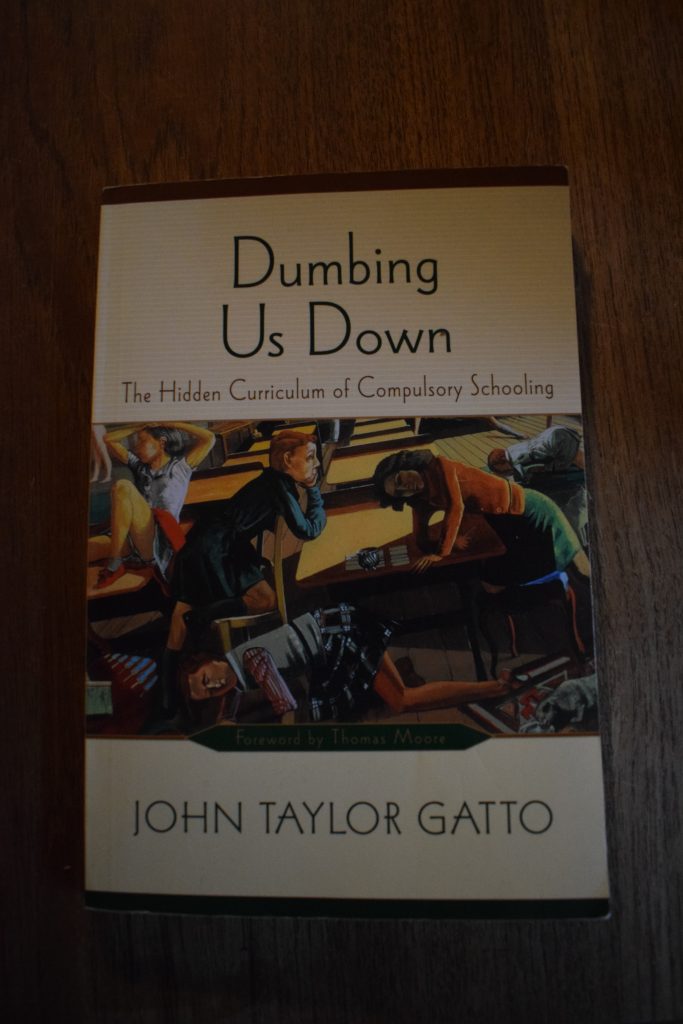What a great read. I enjoyed this book so much. Having already read “School is dead” by Everett Reimer, “Hvis Skolen Ikke Fantes”, Nils Christie and “Deschooling Society”, Ivan Illich, all books from around 1970, it was interesting to read “Dumbing Us Down” by John Taylor Gatto. A book published in 1992. He was just as John Holt, a school teacher, who became disillusioned with the American school system. While, John Holt only stayed a brief period of time in the school system, as a teacher, John Taylor Gatto stayed for 30 years. Mainly in the New York area. He taught both rich and poor students, but his experiences with the pupils in the school system were the same.

In 1991 John Taylor Gatto was named “New York State Teacher of the Year”. On that occasion, he gave a speech. This is where he for the first time put forward his “Seven-Lesson Schoolteacher” where he describes the function of at School Teacher. In real life. Not how we theoretically want a School Teachers function to be. But how his 30 years of experience in the system, had been.
Here we go:
- Confusion. A constant violation of natural order and sequence dismissed as quality in education.
- Class Position. You come to know your place.
- Indifference. When the bell rings, what you have learned, don’t matter anymore.
- Emotional Dependency. You have to surrender your own will to the predestinated chain of command.
- Intellectual Dependency. Good people wait for an expert to tell them what to do.
- Provisional Self-Esteem. People need to be told what they are worth.
- One Can’t hide. There are no private spaces for children, there is no private time.
He also makes a short summary of how new compulsory schooling is. In the USA it came about in the State of Massachusetts around 1850. 80% of Massachusetts population resisted, sometimes with guns, and did not surrender its children until the 1880s, when the area was seized by militia and the children marched to school under guard.
That Schools were designed to be instruments for the scientific management of a mass population. Schools are intended to produce humans whose behavior can be predicted and controlled.
Two institutions at present control our childrens lives: Television and Schooling, in that order. Both of these reduce the real world of wisdom, courage, temperance, and justice to a never-ending, nonstop abstraction. In the past our childrens lives would have been occupied by real work, real charity, real adventures, and the realistic search for mentors who might teach you what you really want to learn.
He makes a calculus of time the Children in School must deal with: Out of 168 hours a week children sleep 56. That leaves them 112 hours to fashion a self. Children watch 55 hours of television a week. That leaves them 57 hours to grow up. Children attend school 30 hours a week, use 8 hours to get ready and travelling to school, 7 hours on homework – a total of 45 hours. During that time they are under constant surveillance. they have no private time or private space. That leaves them 12 hours a week out of which to create a unique consciousness. Of course, the children eat too, that takes some time – but not much, as they have lost the tradition of family dining. So we allot 3 hours a week to eating, and that leaves a child with 9 hours of private time a week.
Gatto tells what effect this has on his pupils:
- They are indifferent to the adult world. Nobody want’s to grow up.
- They have no curiosity. They cannot concentrate for very long at a time.
- They have a poor sense of the future, of how tomorrow is inextricably linked to today.
- They become ahistorical. They have no idea about how the past has predestinated their own present.
- They are cruel to each other, lack compassion for misfortune, laugh at weakness.
- They are uneasy with intimacy. For their whole life they have hidden their inner self inside a larger outer personality made up of artificial bits and pieces of behavior borrowed from television or acquired to manipulate teachers.
- They are materialistic, grade everything as a School teacher and copy television mentors who offer everything in the world for sale.
- They are dependent and passive.
How can we turn this around? Gatto says it is not about pouring more money into a sinking ship. We have to rethink what it is we want our children to learn and why. Gatto is a fond believer in mentors. Including all groups of the community into the community again. Not separating the population into groups of parasites and putting working people on a pedestal. He did many programs for his pupils where they committed themselves to community service. Many of those pupils came back many years later and told him how that experience had changed their lives. How it had helped them rethink goals and values.
Gatto says that it is time for a return to democracy, individuality and family.
Gatto makes a sharp distinction between Networks and Communities. He believes that todays schools are called communities, but are really networks. There is nothing wrong with networks, but if we believe they have the values of communities, we are left betrayed and lonely.
To sum up the book, it is a great critical view on our current education system. We need to review how we think and understand learning. Education does not equal learning. A good life does not equal a constant march towards achieving material goods and distinctions.
